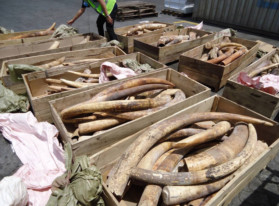
Dubai: While the UAE is not a source or a target country for the illegal trade of ivory, it has contributed to the fight against this illegal trade that is bringing the elephant population closer to extinction.
Most illegal ivory is destined for Asia, in particular China.
With August 12 being World Elephant Day, Jason Bell, Director of the International Fund for Animal Welfare’s (IFAW) Elephant Programme, said, “As animal lovers around the world get ready to celebrate World Elephant Day it’s worth reflecting that, since the beginning of January, not a single week has passed without law enforcers confiscating shipments of ivory, both large and small. At least 35,000 elephants a year die the cruellest of deaths to supply the trade.”
He explained that every seizure of ivory represents the slaughter of elephants wherever they live, but most elephants are in Africa, “in countries where poverty and political insecurity make it possible for poachers and trafficking cartels to operate unhindered”.
“In seven months we have seen nearly 10 tonnes of ivory seized in large scale consignments — those over 500 kilograms which Interpol, the global security agency, say are the indicators of organised crime being behind the illicit ivory trade,” Bell said. “This figure does not include the numerous other seizures smaller than 500kg.”
The UAE is not a destination country for the ivory trade, but its central location on the world map makes it a transit hub.
Authorities at Dubai International Airport announced earlier this year that they had seized 1,500 ivory products and tusks in the last three years. The figures were released at a press conference for a 20-day campaign in June at Dubai Airports aimed to build passenger awareness about the illegality of carrying and smuggling ivory. It was organised by Dubai Police, Dubai Airports Authority, the Ministry of Environment and Water and IFAW.
Dr Al Sayed Mohammad, Regional Director of the IFAW-Middle East and North Africa, had earlier said that ivory is smuggled from Africa to Asia, and that the two main destination countries are China and Thailand.
Dr Mohammad had previously thanked Dubai Airports for the campaign, and its efforts in raising awareness about the issue.
Maha Oda, Campaigns Officer at IFAW, told Gulf News that the UAE has contributed in the fight against the illegal trade.
“IFAW, in collaboration with the UAE’s Ministry of Education, had launched ‘Elephants Never Forget’ in 2011 and ‘Big Trunks Tiny Tales’ in 2012 to raise awareness and educate them [schoolchildren] about elephant conservation. Our Animal Action programmes have reached more than 50,000 students.” Maha said.
She added that IFAW has also worked with different UAE government entities by providing capacity-building programmes for its employees to raise awareness about elephant conservation and the ivory trade.
Bell said there is a lot of worldwide action to save elephants. “There is greater awareness and commitment from governments, law enforcers and civil society than ever to cooperate to bring an end to the slaughter of elephants”.
He said that IFAW trains law enforcement officers in wildlife trafficking prevention in several countries throughout Africa, the Middle East, Asia, Oceania, and the Caribbean and also works with Interpol’s Environmental Crime Programme.
IFAW said that while it applauded any confiscation of illegal ivory, it was crucial that governments looked beyond seizures as the answer to disrupting trafficking.
“The only way countries are going to stop poaching of elephants and illegal trade is by cooperating with agencies such as Interpol, and the law enforcement bodies of other governments to map and profile those behind this transnational criminal activity and dedicate the resources needed to reduce the capacity of those who seek profit from ivory trafficking.” Bell said.












